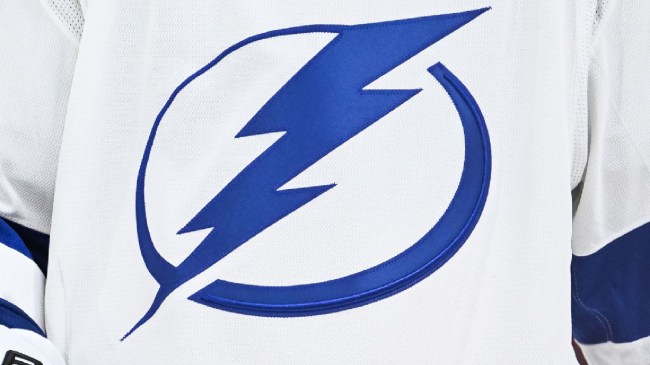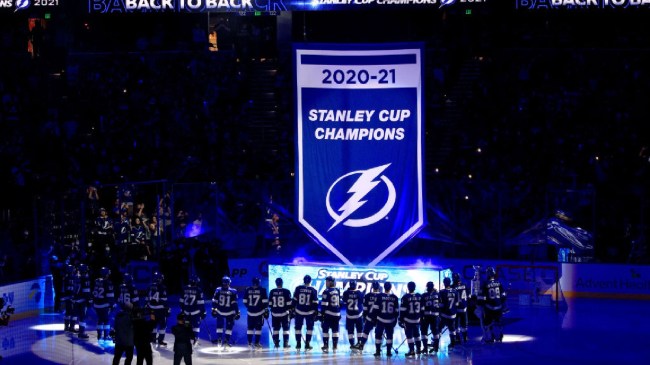
Getty Image
The Tampa Bay Lighting have been one of the most successful teams in the NHL in the past decade or so, but it took them a fair amount of time to find their footing after joining the league in 1992. That inaugural season marked the start of a somewhat rocky stretch for the Lightning, who may or may not have been owned by the Yakuza during that era.
The Lightning really found their footing in the wake of the new millennium. In the early 2000s, notable names like Vincent Lecavalier, Nikolai Khabibulin, and Martin St. Louis started to gel on the ice under the guidance of head coach John Tortorella, and GM Jay Feaster really began to put all of the pieces together to help the Bolts win their first Stanely Cup in 2004.
That championship was a much-needed leap forward for a Tampa Bay team that had spent most of the first decade of its existence being painted as an embarrassment to the rest of the league thanks in no small part to some owners who didn’t really have what it took to run an NHL franchise—including one man with ties to the Japanese mafia.
How the Yakuza allegedly gained control of the Tampa Bay Lightning

Getty Image
For the most part, people who own sports franchises take one of two routes when it comes to overseeing operations.
In one camp, you have incredibly visible and involved owners like Mark Cuban, Jerry Jones, and George Steinbrenner, who not only take pride in having a hands-on approach on a day-to-day basis but go out of their way to remind the world they’re the boss.
In the other, you have owners who take a more passive role and are perfectly satisfied with largely remaining behind the scenes; they provide the bankroll, but they’re happy to let people in the front office take care of most of the details.
That second group tends to be the norm in the NHL, as I feel like most hockey fans couldn’t even tell you who owns the team they don’t root for. However, most people were familiar with the two men who positioned themselves as the face of the front office when Tampa Bay got an expansion team in the early 1990s: Hall of Famers Tony and Phil Esposito.
While the two brothers had done pretty well for themselves during their time in the NHL, they still needed a bit of help to win the bidding war the Lightning ended up at the center of.
They’d initially planned to get some financial backing from the Pritzker family (which amassed its fortune on the back of the Hyatt hotel empire), but after those investors backed out, the duo linked up with Kokusai Green, a Japanese company that supposedly relied on the golf courses and resorts it operated for income.
That partnership allowed the ownership group to submit a $50 million bid to secure the rights to the Lightning before Phil announced he’d be serving as General Manager and President while Tony oversaw Tampa Bay’s scouting and development arm.
However, the team’s majority owner was also a silent one, and little was known about Takashi Okubo, the man who owned Kokusai Green but had never even been to the state of Florida (nevermind attended a game there to watch his team play).
Reporters who looked into his background were able to determine he’d amassed a sizeable real estate portfolio in Japan and beyond, but inquiries into his interest (or lack thereof) in the NHL were largely addressed with claims he simply viewed the Lightning as yet another investment opportunity.
However, things took a very interesting turn in 1998. By that point, the Lightning had become a laughing stock plagued by incompetency and financial difficulties (the franchise was losing more than $10 million a year), and Sports Illustrated published an article that strongly suggested Okubo and Kokusai Green were really a front for the Yakuza.
The outlet noted neither one of the Esposito brothers had actually met Okubo, who by that point had installed a couple of fellow Japanese natives into high-ranking positions in the front office. It also cited a lawsuit filed by Marc Ganis (a developer who accused Kokusai Green of reneging on a deal to construct an arena for the team) where Okubo was described as a “gangster.”
It’s worth noting there was never any hard evidence proving those alleged links, but many NHL insiders have said Tampa Bay’s ties with the organized crime syndicate was one of the worst-kept secrets in hockey at the time (it’s believed the league was aware of the issue but didn’t want to draw more attention than was needed to an already beleaguered team).
The Yakuza have a history of using legitimate businesses to launder the money earned via extortion, drug trafficking, prostitution, and other illegal rackets; if you’re an MMA fan, you’re probably familiar with Pride FC, which experienced a dramatic fall from grace in 2006 after a number of reports surfaced containing evidence it was a front for the Japanese mob.
When everything was said and done, Okubo, Kokusai Green, and (possibly) the Yakuza divested themselves from the Lightning when they offloaded the franchise to Art Williams for $117 million in 1999 (the new owner lost $20 million during his first and only season at the helm, and took another hit when he sold it to Detroit Pistons owner William Davidson for $115 the following year).
Things worked out for Tampa Bay in the end, but it’s pretty while they’ve come as far as they have when you consider how everything began.